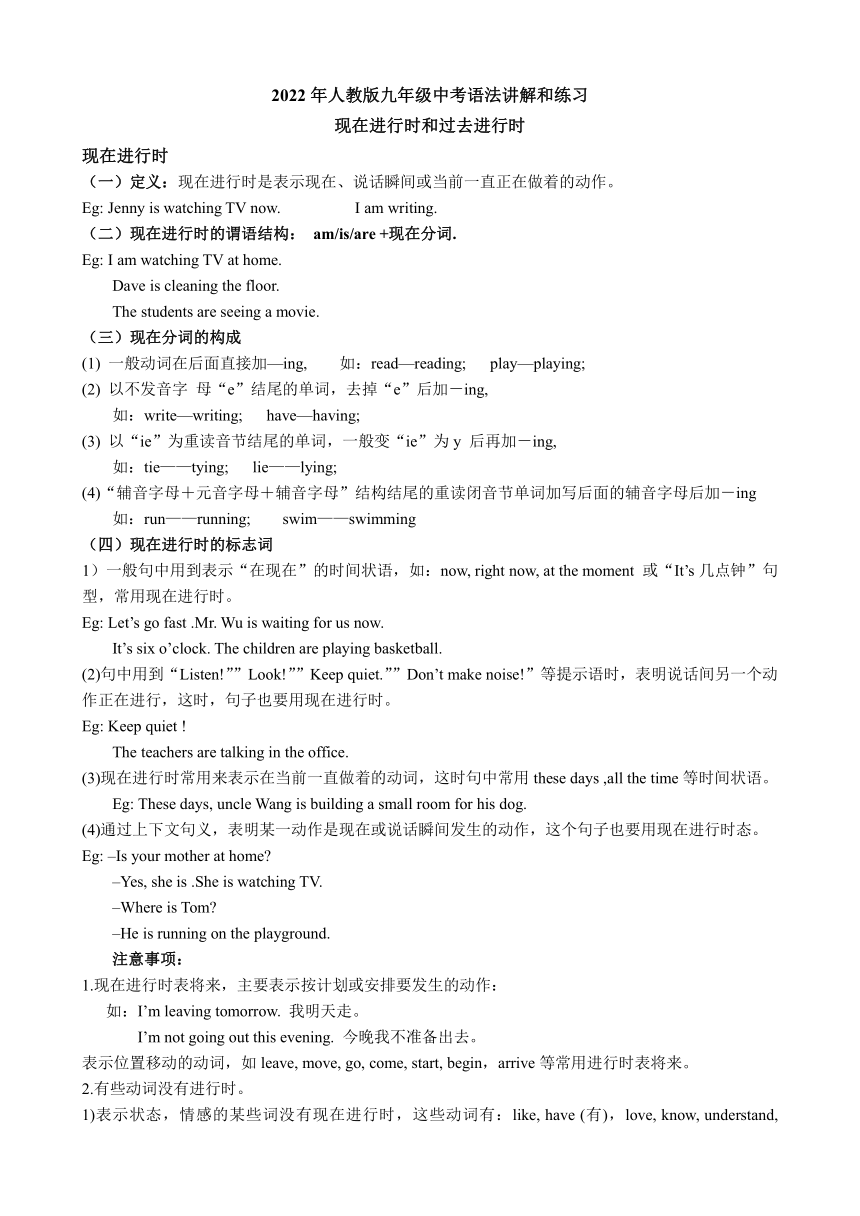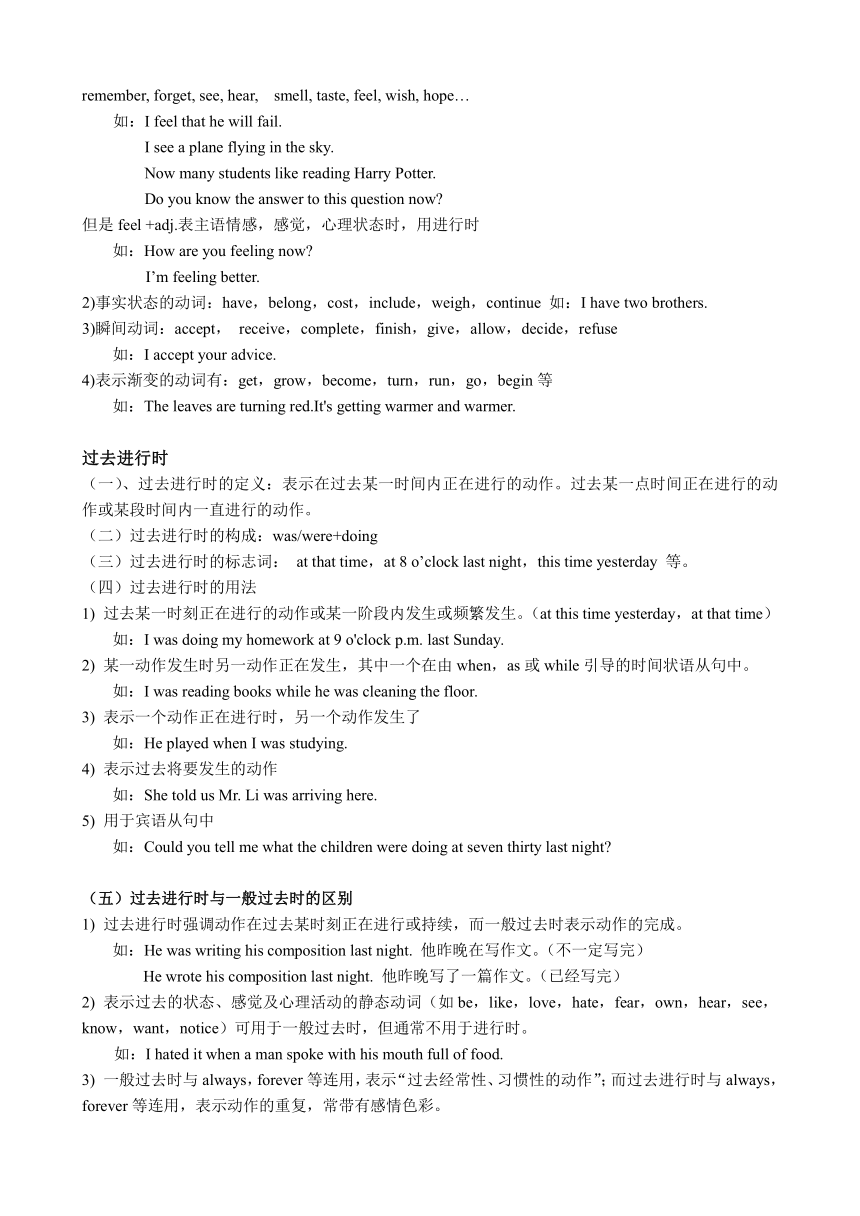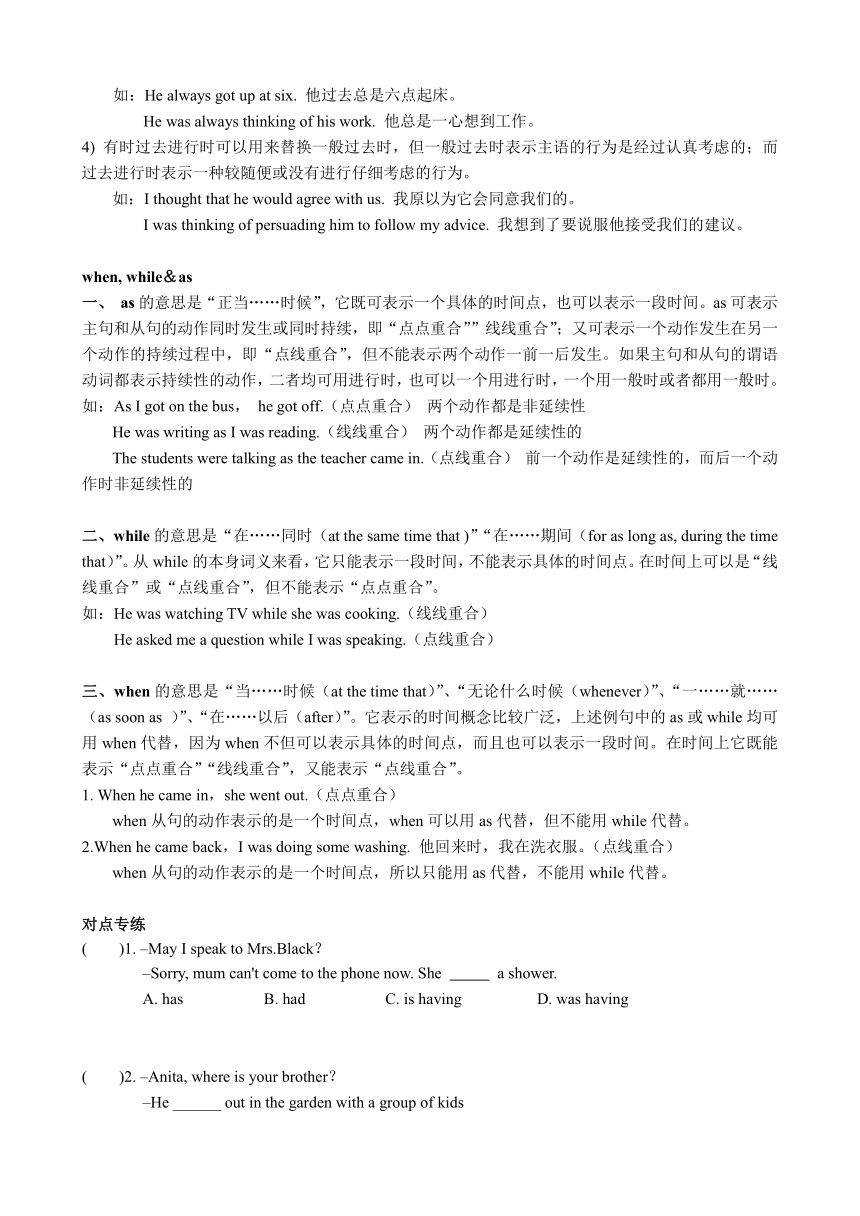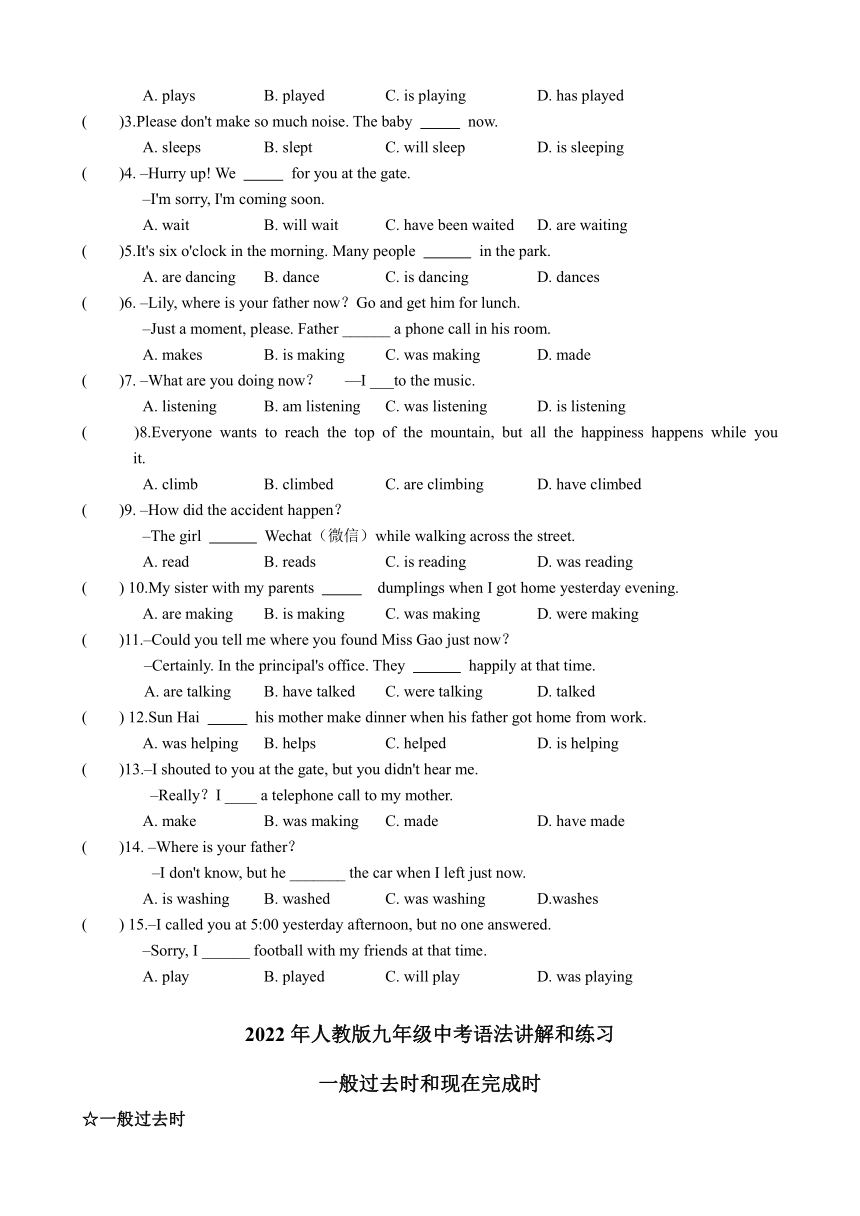2022年九年级中考语法讲解和练习-现在进行和过去进行;一般过去和现在完成
文档属性
| 名称 | 2022年九年级中考语法讲解和练习-现在进行和过去进行;一般过去和现在完成 |  | |
| 格式 | docx | ||
| 文件大小 | 32.1KB | ||
| 资源类型 | 教案 | ||
| 版本资源 | 通用版 | ||
| 科目 | 英语 | ||
| 更新时间 | 2022-04-15 14:55:41 | ||
图片预览




文档简介
2022年人教版九年级中考语法讲解和练习
现在进行时和过去进行时
现在进行时
(一)定义:现在进行时是表示现在、说话瞬间或当前一直正在做着的动作。
Eg: Jenny is watching TV now. I am writing.
(二)现在进行时的谓语结构: am/is/are +现在分词.
Eg: I am watching TV at home.
Dave is cleaning the floor.
The students are seeing a movie.
(三)现在分词的构成
(1) 一般动词在后面直接加—ing, 如:read—reading; play—playing;
(2) 以不发音字 母“e”结尾的单词,去掉“e”后加-ing,
如:write—writing; have—having;
(3) 以“ie”为重读音节结尾的单词,一般变“ie”为y 后再加-ing,
如:tie——tying; lie——lying;
(4)“辅音字母+元音字母+辅音字母”结构结尾的重读闭音节单词加写后面的辅音字母后加-ing
如:run——running; swim——swimming
(四)现在进行时的标志词
1)一般句中用到表示“在现在”的时间状语,如:now, right now, at the moment 或“It’s几点钟”句型,常用现在进行时。
Eg: Let’s go fast .Mr. Wu is waiting for us now.
It’s six o’clock. The children are playing basketball.
(2)句中用到“Listen!””Look!””Keep quiet.””Don’t make noise!”等提示语时,表明说话间另一个动作正在进行,这时,句子也要用现在进行时。
Eg: Keep quiet !
The teachers are talking in the office.
(3)现在进行时常用来表示在当前一直做着的动词,这时句中常用these days ,all the time等时间状语。
Eg: These days, uncle Wang is building a small room for his dog.
(4)通过上下文句义,表明某一动作是现在或说话瞬间发生的动作,这个句子也要用现在进行时态。
Eg: –Is your mother at home
–Yes, she is .She is watching TV.
–Where is Tom
–He is running on the playground.
注意事项:
1.现在进行时表将来,主要表示按计划或安排要发生的动作:
如:I’m leaving tomorrow. 我明天走。
I’m not going out this evening. 今晚我不准备出去。
表示位置移动的动词,如leave, move, go, come, start, begin,arrive等常用进行时表将来。
2.有些动词没有进行时。
1)表示状态,情感的某些词没有现在进行时,这些动词有:like, have (有),love, know, understand, remember, forget, see, hear, smell, taste, feel, wish, hope…
如:I feel that he will fail.
I see a plane flying in the sky.
Now many students like reading Harry Potter.
Do you know the answer to this question now
但是feel +adj.表主语情感,感觉,心理状态时,用进行时
如:How are you feeling now
I’m feeling better.
2)事实状态的动词:have,belong,cost,include,weigh,continue 如:I have two brothers.
3)瞬间动词:accept, receive,complete,finish,give,allow,decide,refuse
如:I accept your advice.
4)表示渐变的动词有:get,grow,become,turn,run,go,begin等
如:The leaves are turning red.It's getting warmer and warmer.
过去进行时
(一)、过去进行时的定义:表示在过去某一时间内正在进行的动作。过去某一点时间正在进行的动作或某段时间内一直进行的动作。
(二)过去进行时的构成:was/were+doing
(三)过去进行时的标志词: at that time,at 8 o’clock last night,this time yesterday 等。
(四)过去进行时的用法
1) 过去某一时刻正在进行的动作或某一阶段内发生或频繁发生。(at this time yesterday,at that time)
如:I was doing my homework at 9 o'clock p.m. last Sunday.
2) 某一动作发生时另一动作正在发生,其中一个在由when,as或while引导的时间状语从句中。
如:I was reading books while he was cleaning the floor.
3) 表示一个动作正在进行时,另一个动作发生了
如:He played when I was studying.
4) 表示过去将要发生的动作
如:She told us Mr. Li was arriving here.
5) 用于宾语从句中
如:Could you tell me what the children were doing at seven thirty last night
(五)过去进行时与一般过去时的区别
1) 过去进行时强调动作在过去某时刻正在进行或持续,而一般过去时表示动作的完成。
如:He was writing his composition last night. 他昨晚在写作文。(不一定写完)
He wrote his composition last night. 他昨晚写了一篇作文。(已经写完)
2) 表示过去的状态、感觉及心理活动的静态动词(如be,like,love,hate,fear,own,hear,see,know,want,notice)可用于一般过去时,但通常不用于进行时。
如:I hated it when a man spoke with his mouth full of food.
3) 一般过去时与always,forever等连用,表示“过去经常性、习惯性的动作”;而过去进行时与always,forever等连用,表示动作的重复,常带有感彩。
如:He always got up at six. 他过去总是六点起床。
He was always thinking of his work. 他总是一心想到工作。
4) 有时过去进行时可以用来替换一般过去时,但一般过去时表示主语的行为是经过认真考虑的;而过去进行时表示一种较随便或没有进行仔细考虑的行为。
如:I thought that he would agree with us. 我原以为它会同意我们的。
I was thinking of persuading him to follow my advice. 我想到了要说服他接受我们的建议。
when, while&as
一、 as的意思是“正当……时候”,它既可表示一个具体的时间点,也可以表示一段时间。as可表示主句和从句的动作同时发生或同时持续,即“点点重合””线线重合”;又可表示一个动作发生在另一个动作的持续过程中,即“点线重合”,但不能表示两个动作一前一后发生。如果主句和从句的谓语动词都表示持续性的动作,二者均可用进行时,也可以一个用进行时,一个用一般时或者都用一般时。如:As I got on the bus, he got off.(点点重合) 两个动作都是非延续性
He was writing as I was reading.(线线重合) 两个动作都是延续性的
The students were talking as the teacher came in.(点线重合) 前一个动作是延续性的,而后一个动作时非延续性的
二、while的意思是“在……同时(at the same time that )”“在……期间(for as long as, during the time that)”。从while的本身词义来看,它只能表示一段时间,不能表示具体的时间点。在时间上可以是“线线重合”或“点线重合”,但不能表示“点点重合”。
如:He was watching TV while she was cooking.(线线重合)
He asked me a question while I was speaking.(点线重合)
三、when的意思是“当……时候(at the time that)”、“无论什么时候(whenever)”、“一……就……(as soon as )”、“在……以后(after)”。它表示的时间概念比较广泛,上述例句中的as或while均可用when代替,因为when不但可以表示具体的时间点,而且也可以表示一段时间。在时间上它既能表示“点点重合”“线线重合”,又能表示“点线重合”。
1. When he came in,she went out.(点点重合)
when从句的动作表示的是一个时间点,when可以用as代替,但不能用while代替。
2.When he came back,I was doing some washing. 他回来时,我在洗衣服。(点线重合)
when从句的动作表示的是一个时间点,所以只能用as代替,不能用while代替。
对点专练
( )1. –May I speak to Mrs.Black?
–Sorry, mum can't come to the phone now. She a shower.
A. has B. had C. is having D. was having
( )2. –Anita, where is your brother?
–He ______ out in the garden with a group of kids
A. plays B. played C. is playing D. has played
( )3.Please don't make so much noise. The baby now.
A. sleeps B. slept C. will sleep D. is sleeping
( )4. –Hurry up! We for you at the gate.
–I'm sorry, I'm coming soon.
A. wait B. will wait C. have been waited D. are waiting
( )5.It's six o'clock in the morning. Many people in the park.
A. are dancing B. dance C. is dancing D. dances
( )6. –Lily, where is your father now?Go and get him for lunch.
–Just a moment, please. Father ______ a phone call in his room.
A. makes B. is making C. was making D. made
( )7. –What are you doing now? —I ___to the music.
A. listening B. am listening C. was listening D. is listening
( )8.Everyone wants to reach the top of the mountain, but all the happiness happens while you it.
A. climb B. climbed C. are climbing D. have climbed
( )9. –How did the accident happen?
–The girl Wechat(微信)while walking across the street.
A. read B. reads C. is reading D. was reading
( ) 10.My sister with my parents dumplings when I got home yesterday evening.
A. are making B. is making C. was making D. were making
( )11.–Could you tell me where you found Miss Gao just now?
–Certainly. In the principal's office. They happily at that time.
A. are talking B. have talked C. were talking D. talked
( ) 12.Sun Hai his mother make dinner when his father got home from work.
A. was helping B. helps C. helped D. is helping
( )13.–I shouted to you at the gate, but you didn't hear me.
–Really?I ____ a telephone call to my mother.
A. make B. was making C. made D. have made
( )14. –Where is your father?
–I don't know, but he _______ the car when I left just now.
A. is washing B. washed C. was washing D.washes
( ) 15.–I called you at 5:00 yesterday afternoon, but no one answered.
–Sorry, I ______ football with my friends at that time.
A. play B. played C. will play D. was playing
2022年人教版九年级中考语法讲解和练习
一般过去时和现在完成时
☆一般过去时
表现形式 例句
用法 1. 表示过去某个时间里发生的动作或存在的状态 The little boy was born in 2007 You arrived late yesterday.
2. 表示过去习惯性、经常性的动作或状态 She often went to the park last year.
句型结构 肯定句(1)主语+动词过去式(-ed) (2)主语+was/were+表语 We played soccer last night. They were in the room just now.
否定句:(1)主语+didn’t+动词原形 (2)主语+wasn’t/weren’t+表语 We didn’t play soccer last night. They weren’t here just now.
一般疑问句:(1)Did+主语+动词原形? (2)Was/Were+主语+表语 Did you see the film last night Were you OK
标志词 时间段+ago;yesterday; the day before yesterday; last week (year, night, month...); in 1989; just now; in the past; in those days...
注意: 有时候上下文中并没有具体的过去时间的时间状语,这时候必须联系上下文语境来判断应该时态
-Excuse me, sir. This is a non-smoking room.
-Oh, sorry. I didn’t see the sign. (吸烟之前没看见标志,但现在看见了)
Ken left his jacket in the gym. He has to get it back.
(leave发生在has to之前,表示过去)
☆现在完成时
表现形式 例句
用法 1. 强调过去发生或已经完成的动作对现在造成的影响或结果。 I have had lunch already.
2. 表示过去已经开始的某一动作或状态一直持续到现在,还可能会持续下去。 The film has been on for ten minutes.
句型结构 肯定句:主语+have/has+P.P(过去分词) I have already had lunch.
否定句:主语+haven’t/hasn’t+P.P(过去分词) I haven’t had lunch yet.
疑问句:Have/has+主语+P.P(过去分词)? Have you had lunch yet
标志词 already已经(肯定/句中),just刚刚(肯定/句中),yet还,已经(否/句末),ever曾经(疑问句/句中), never(句中),before(句末),so far=by now到目前为止,recently=lately最近,in the past/last few years(days, weeks, months...)近几年/天/周/月里,twice/three times...; Since +过去的时间点(一般过去时的从句子短语)自从……到现在 for +时间段
备注 区别: have/has gone to去了某地(人现在还没回来) —Where is your father —He has gone to Shanghai have/has been to去过某地(人现在已经回来了) He has been to Shanghai twice. have/has been in在某地已经多长时间了(通常与for/since连用) He has been in Dongguan for three years. It’s+一段时间+since+一般过去时的句子 “自从……到现在已经多长时间” It’s three years since he came to China.
☆现在完成时与一般过去时的用法比较
两者所表示的动作都发生在过去,但现在完成时强调这一动作对现在的影响;一般过去时侧重于过去的动作,与现在无关。
I saw this film last weekend. (陈述上周末做的一件事情)
I have seen this film. (强调对现在的影响:电影的内容已经知道了)
★【特别关注】延续性动词与非延续性动词
动词按其动作发生的方式、发生过程的长短可分为延续性动词与非延续性动词。
延续性动词表示能够延续的动作,如:learn, work, stand, sleep, live, stay。延续性
动词可以与表示时间段的状语(for, since, how long等)连用
eg: You can keep the book for 5 days. I stayed there for 2 weeks last year.
非延续性动词也称瞬间动词或短暂性动词,表示不能延续的动作,这种动作发生后立即结束,不能与时间段(for, since, how long等)连用。如:open, die, close, begin, finish, come, go, move, borrow, lend, buy。如果要与时间段连用,就把它转为延续性动词使用。
中考中常见的非延续性动词与延续性动词之间的转换有:
borrow —
buy—
open—
close—
leave—
become—
finish—
die—
begin/start—
fall ill—
get married—
catch a cold—
come back—
come here—
join—
Eg: The old man died 4 years ago. —> The old man has____________ for 4 years.
He joined the Party 2 years ago. —>He has ____________ for 2 years.
He has____________ for 2 years.
I bought the book 5 days ago. —> I have ____________ for 5 days.
对点训练
( ) 1. –Look at the sigh! It says “No Smoking”.
– Oh, sorry. I ______ it.
A. don’t see B. haven’t seen C. wasn’t seen D. didn’t see
( ) 2. He speaks English very well because he ______ in the US for 20 years.
A. lives B. lived C. has lived D. had lived
( ) 3. The water ______ dark and dirty. It’s no longer safe to drink.
A. became B. has become C. will become D. was becoming
( ) 4.–Your coat fits you well.
–Thank you. I ______ it when it was on sale.
A. have bought B. buy C. bought D. will buy
( ) 5.–I have ever seen Alice in Wonderland II.
–When ______ – Two weeks ago.
A. did you see it B. have you seen it C. do you see it D. will you see it
( ) 6. My mother ______ a good example for me since I was young.
A. was B. has been C. has set D. is
( ) 7. It seems that Elnino ______ some disasters in the world in the past few months.
A. has caused B. is causing C. will cause D. caused
( ) 8.–May I speak to Mr.Lee
–Sorry, he ______ Harbin, and he ______ the city for two days.
A. has been to; has been in B. has gone to; has been to
C. has gone to; has been in
( ) 9.–Did you see Tom yesterday
–No, I ______ him for a long time.
A. didn’t see B. hasn’t seen C. saw D. haven’t seen
( ) 10. Over fifty countries ______ the AIIB(亚投行)so far.
A. joined B. was joining C. had joine D. have joined
( ) 11. I ______ the book club last week and I ______ two books already.
A. join; read B. joined; read
C. joined; have read D. joined; readed
( ) 12.–The coffee shop ____ for two months nearby. Let’s go and have a taste.
– Good idea. But it doesn’t ________ on Tuesdays.
A. opened, opened B. has been opened, open
C. has been open, open D. has opened, opened.
( ) 13.–Your shoes are so old. Why don’t you buy a new pair
–Because I _____ all my money on an MP5.
A. Spend B. have spent C. am spending D. was spending
( ) 14. –Do you know her well
–Sure.We ___ friends since ten years ago.
A. were B. have made C. have been D. have become
( ) 15. –How happy the grandparents are!
–Yes, they ______ for fifty years.
A. have been married B. have married
C. have got married D. married
( ) 16. –When ______ you ______ the new bike
–I ______ it for 2 days.
A. did, have; bought B. did, buy; have had C. did, buy; have bough
现在进行时和过去进行时
现在进行时
(一)定义:现在进行时是表示现在、说话瞬间或当前一直正在做着的动作。
Eg: Jenny is watching TV now. I am writing.
(二)现在进行时的谓语结构: am/is/are +现在分词.
Eg: I am watching TV at home.
Dave is cleaning the floor.
The students are seeing a movie.
(三)现在分词的构成
(1) 一般动词在后面直接加—ing, 如:read—reading; play—playing;
(2) 以不发音字 母“e”结尾的单词,去掉“e”后加-ing,
如:write—writing; have—having;
(3) 以“ie”为重读音节结尾的单词,一般变“ie”为y 后再加-ing,
如:tie——tying; lie——lying;
(4)“辅音字母+元音字母+辅音字母”结构结尾的重读闭音节单词加写后面的辅音字母后加-ing
如:run——running; swim——swimming
(四)现在进行时的标志词
1)一般句中用到表示“在现在”的时间状语,如:now, right now, at the moment 或“It’s几点钟”句型,常用现在进行时。
Eg: Let’s go fast .Mr. Wu is waiting for us now.
It’s six o’clock. The children are playing basketball.
(2)句中用到“Listen!””Look!””Keep quiet.””Don’t make noise!”等提示语时,表明说话间另一个动作正在进行,这时,句子也要用现在进行时。
Eg: Keep quiet !
The teachers are talking in the office.
(3)现在进行时常用来表示在当前一直做着的动词,这时句中常用these days ,all the time等时间状语。
Eg: These days, uncle Wang is building a small room for his dog.
(4)通过上下文句义,表明某一动作是现在或说话瞬间发生的动作,这个句子也要用现在进行时态。
Eg: –Is your mother at home
–Yes, she is .She is watching TV.
–Where is Tom
–He is running on the playground.
注意事项:
1.现在进行时表将来,主要表示按计划或安排要发生的动作:
如:I’m leaving tomorrow. 我明天走。
I’m not going out this evening. 今晚我不准备出去。
表示位置移动的动词,如leave, move, go, come, start, begin,arrive等常用进行时表将来。
2.有些动词没有进行时。
1)表示状态,情感的某些词没有现在进行时,这些动词有:like, have (有),love, know, understand, remember, forget, see, hear, smell, taste, feel, wish, hope…
如:I feel that he will fail.
I see a plane flying in the sky.
Now many students like reading Harry Potter.
Do you know the answer to this question now
但是feel +adj.表主语情感,感觉,心理状态时,用进行时
如:How are you feeling now
I’m feeling better.
2)事实状态的动词:have,belong,cost,include,weigh,continue 如:I have two brothers.
3)瞬间动词:accept, receive,complete,finish,give,allow,decide,refuse
如:I accept your advice.
4)表示渐变的动词有:get,grow,become,turn,run,go,begin等
如:The leaves are turning red.It's getting warmer and warmer.
过去进行时
(一)、过去进行时的定义:表示在过去某一时间内正在进行的动作。过去某一点时间正在进行的动作或某段时间内一直进行的动作。
(二)过去进行时的构成:was/were+doing
(三)过去进行时的标志词: at that time,at 8 o’clock last night,this time yesterday 等。
(四)过去进行时的用法
1) 过去某一时刻正在进行的动作或某一阶段内发生或频繁发生。(at this time yesterday,at that time)
如:I was doing my homework at 9 o'clock p.m. last Sunday.
2) 某一动作发生时另一动作正在发生,其中一个在由when,as或while引导的时间状语从句中。
如:I was reading books while he was cleaning the floor.
3) 表示一个动作正在进行时,另一个动作发生了
如:He played when I was studying.
4) 表示过去将要发生的动作
如:She told us Mr. Li was arriving here.
5) 用于宾语从句中
如:Could you tell me what the children were doing at seven thirty last night
(五)过去进行时与一般过去时的区别
1) 过去进行时强调动作在过去某时刻正在进行或持续,而一般过去时表示动作的完成。
如:He was writing his composition last night. 他昨晚在写作文。(不一定写完)
He wrote his composition last night. 他昨晚写了一篇作文。(已经写完)
2) 表示过去的状态、感觉及心理活动的静态动词(如be,like,love,hate,fear,own,hear,see,know,want,notice)可用于一般过去时,但通常不用于进行时。
如:I hated it when a man spoke with his mouth full of food.
3) 一般过去时与always,forever等连用,表示“过去经常性、习惯性的动作”;而过去进行时与always,forever等连用,表示动作的重复,常带有感彩。
如:He always got up at six. 他过去总是六点起床。
He was always thinking of his work. 他总是一心想到工作。
4) 有时过去进行时可以用来替换一般过去时,但一般过去时表示主语的行为是经过认真考虑的;而过去进行时表示一种较随便或没有进行仔细考虑的行为。
如:I thought that he would agree with us. 我原以为它会同意我们的。
I was thinking of persuading him to follow my advice. 我想到了要说服他接受我们的建议。
when, while&as
一、 as的意思是“正当……时候”,它既可表示一个具体的时间点,也可以表示一段时间。as可表示主句和从句的动作同时发生或同时持续,即“点点重合””线线重合”;又可表示一个动作发生在另一个动作的持续过程中,即“点线重合”,但不能表示两个动作一前一后发生。如果主句和从句的谓语动词都表示持续性的动作,二者均可用进行时,也可以一个用进行时,一个用一般时或者都用一般时。如:As I got on the bus, he got off.(点点重合) 两个动作都是非延续性
He was writing as I was reading.(线线重合) 两个动作都是延续性的
The students were talking as the teacher came in.(点线重合) 前一个动作是延续性的,而后一个动作时非延续性的
二、while的意思是“在……同时(at the same time that )”“在……期间(for as long as, during the time that)”。从while的本身词义来看,它只能表示一段时间,不能表示具体的时间点。在时间上可以是“线线重合”或“点线重合”,但不能表示“点点重合”。
如:He was watching TV while she was cooking.(线线重合)
He asked me a question while I was speaking.(点线重合)
三、when的意思是“当……时候(at the time that)”、“无论什么时候(whenever)”、“一……就……(as soon as )”、“在……以后(after)”。它表示的时间概念比较广泛,上述例句中的as或while均可用when代替,因为when不但可以表示具体的时间点,而且也可以表示一段时间。在时间上它既能表示“点点重合”“线线重合”,又能表示“点线重合”。
1. When he came in,she went out.(点点重合)
when从句的动作表示的是一个时间点,when可以用as代替,但不能用while代替。
2.When he came back,I was doing some washing. 他回来时,我在洗衣服。(点线重合)
when从句的动作表示的是一个时间点,所以只能用as代替,不能用while代替。
对点专练
( )1. –May I speak to Mrs.Black?
–Sorry, mum can't come to the phone now. She a shower.
A. has B. had C. is having D. was having
( )2. –Anita, where is your brother?
–He ______ out in the garden with a group of kids
A. plays B. played C. is playing D. has played
( )3.Please don't make so much noise. The baby now.
A. sleeps B. slept C. will sleep D. is sleeping
( )4. –Hurry up! We for you at the gate.
–I'm sorry, I'm coming soon.
A. wait B. will wait C. have been waited D. are waiting
( )5.It's six o'clock in the morning. Many people in the park.
A. are dancing B. dance C. is dancing D. dances
( )6. –Lily, where is your father now?Go and get him for lunch.
–Just a moment, please. Father ______ a phone call in his room.
A. makes B. is making C. was making D. made
( )7. –What are you doing now? —I ___to the music.
A. listening B. am listening C. was listening D. is listening
( )8.Everyone wants to reach the top of the mountain, but all the happiness happens while you it.
A. climb B. climbed C. are climbing D. have climbed
( )9. –How did the accident happen?
–The girl Wechat(微信)while walking across the street.
A. read B. reads C. is reading D. was reading
( ) 10.My sister with my parents dumplings when I got home yesterday evening.
A. are making B. is making C. was making D. were making
( )11.–Could you tell me where you found Miss Gao just now?
–Certainly. In the principal's office. They happily at that time.
A. are talking B. have talked C. were talking D. talked
( ) 12.Sun Hai his mother make dinner when his father got home from work.
A. was helping B. helps C. helped D. is helping
( )13.–I shouted to you at the gate, but you didn't hear me.
–Really?I ____ a telephone call to my mother.
A. make B. was making C. made D. have made
( )14. –Where is your father?
–I don't know, but he _______ the car when I left just now.
A. is washing B. washed C. was washing D.washes
( ) 15.–I called you at 5:00 yesterday afternoon, but no one answered.
–Sorry, I ______ football with my friends at that time.
A. play B. played C. will play D. was playing
2022年人教版九年级中考语法讲解和练习
一般过去时和现在完成时
☆一般过去时
表现形式 例句
用法 1. 表示过去某个时间里发生的动作或存在的状态 The little boy was born in 2007 You arrived late yesterday.
2. 表示过去习惯性、经常性的动作或状态 She often went to the park last year.
句型结构 肯定句(1)主语+动词过去式(-ed) (2)主语+was/were+表语 We played soccer last night. They were in the room just now.
否定句:(1)主语+didn’t+动词原形 (2)主语+wasn’t/weren’t+表语 We didn’t play soccer last night. They weren’t here just now.
一般疑问句:(1)Did+主语+动词原形? (2)Was/Were+主语+表语 Did you see the film last night Were you OK
标志词 时间段+ago;yesterday; the day before yesterday; last week (year, night, month...); in 1989; just now; in the past; in those days...
注意: 有时候上下文中并没有具体的过去时间的时间状语,这时候必须联系上下文语境来判断应该时态
-Excuse me, sir. This is a non-smoking room.
-Oh, sorry. I didn’t see the sign. (吸烟之前没看见标志,但现在看见了)
Ken left his jacket in the gym. He has to get it back.
(leave发生在has to之前,表示过去)
☆现在完成时
表现形式 例句
用法 1. 强调过去发生或已经完成的动作对现在造成的影响或结果。 I have had lunch already.
2. 表示过去已经开始的某一动作或状态一直持续到现在,还可能会持续下去。 The film has been on for ten minutes.
句型结构 肯定句:主语+have/has+P.P(过去分词) I have already had lunch.
否定句:主语+haven’t/hasn’t+P.P(过去分词) I haven’t had lunch yet.
疑问句:Have/has+主语+P.P(过去分词)? Have you had lunch yet
标志词 already已经(肯定/句中),just刚刚(肯定/句中),yet还,已经(否/句末),ever曾经(疑问句/句中), never(句中),before(句末),so far=by now到目前为止,recently=lately最近,in the past/last few years(days, weeks, months...)近几年/天/周/月里,twice/three times...; Since +过去的时间点(一般过去时的从句子短语)自从……到现在 for +时间段
备注 区别: have/has gone to去了某地(人现在还没回来) —Where is your father —He has gone to Shanghai have/has been to去过某地(人现在已经回来了) He has been to Shanghai twice. have/has been in在某地已经多长时间了(通常与for/since连用) He has been in Dongguan for three years. It’s+一段时间+since+一般过去时的句子 “自从……到现在已经多长时间” It’s three years since he came to China.
☆现在完成时与一般过去时的用法比较
两者所表示的动作都发生在过去,但现在完成时强调这一动作对现在的影响;一般过去时侧重于过去的动作,与现在无关。
I saw this film last weekend. (陈述上周末做的一件事情)
I have seen this film. (强调对现在的影响:电影的内容已经知道了)
★【特别关注】延续性动词与非延续性动词
动词按其动作发生的方式、发生过程的长短可分为延续性动词与非延续性动词。
延续性动词表示能够延续的动作,如:learn, work, stand, sleep, live, stay。延续性
动词可以与表示时间段的状语(for, since, how long等)连用
eg: You can keep the book for 5 days. I stayed there for 2 weeks last year.
非延续性动词也称瞬间动词或短暂性动词,表示不能延续的动作,这种动作发生后立即结束,不能与时间段(for, since, how long等)连用。如:open, die, close, begin, finish, come, go, move, borrow, lend, buy。如果要与时间段连用,就把它转为延续性动词使用。
中考中常见的非延续性动词与延续性动词之间的转换有:
borrow —
buy—
open—
close—
leave—
become—
finish—
die—
begin/start—
fall ill—
get married—
catch a cold—
come back—
come here—
join—
Eg: The old man died 4 years ago. —> The old man has____________ for 4 years.
He joined the Party 2 years ago. —>He has ____________ for 2 years.
He has____________ for 2 years.
I bought the book 5 days ago. —> I have ____________ for 5 days.
对点训练
( ) 1. –Look at the sigh! It says “No Smoking”.
– Oh, sorry. I ______ it.
A. don’t see B. haven’t seen C. wasn’t seen D. didn’t see
( ) 2. He speaks English very well because he ______ in the US for 20 years.
A. lives B. lived C. has lived D. had lived
( ) 3. The water ______ dark and dirty. It’s no longer safe to drink.
A. became B. has become C. will become D. was becoming
( ) 4.–Your coat fits you well.
–Thank you. I ______ it when it was on sale.
A. have bought B. buy C. bought D. will buy
( ) 5.–I have ever seen Alice in Wonderland II.
–When ______ – Two weeks ago.
A. did you see it B. have you seen it C. do you see it D. will you see it
( ) 6. My mother ______ a good example for me since I was young.
A. was B. has been C. has set D. is
( ) 7. It seems that Elnino ______ some disasters in the world in the past few months.
A. has caused B. is causing C. will cause D. caused
( ) 8.–May I speak to Mr.Lee
–Sorry, he ______ Harbin, and he ______ the city for two days.
A. has been to; has been in B. has gone to; has been to
C. has gone to; has been in
( ) 9.–Did you see Tom yesterday
–No, I ______ him for a long time.
A. didn’t see B. hasn’t seen C. saw D. haven’t seen
( ) 10. Over fifty countries ______ the AIIB(亚投行)so far.
A. joined B. was joining C. had joine D. have joined
( ) 11. I ______ the book club last week and I ______ two books already.
A. join; read B. joined; read
C. joined; have read D. joined; readed
( ) 12.–The coffee shop ____ for two months nearby. Let’s go and have a taste.
– Good idea. But it doesn’t ________ on Tuesdays.
A. opened, opened B. has been opened, open
C. has been open, open D. has opened, opened.
( ) 13.–Your shoes are so old. Why don’t you buy a new pair
–Because I _____ all my money on an MP5.
A. Spend B. have spent C. am spending D. was spending
( ) 14. –Do you know her well
–Sure.We ___ friends since ten years ago.
A. were B. have made C. have been D. have become
( ) 15. –How happy the grandparents are!
–Yes, they ______ for fifty years.
A. have been married B. have married
C. have got married D. married
( ) 16. –When ______ you ______ the new bike
–I ______ it for 2 days.
A. did, have; bought B. did, buy; have had C. did, buy; have bough
同课章节目录
- 词法
- 名词
- 动词和动词短语
- 动词语态
- 动词时态
- 助动词和情态动词
- 非谓语动词
- 冠词
- 代词
- 数词和量词
- 形容词副词及其比较等级
- 介词和介词短语
- 连词和感叹词
- 构词法
- 相似、相近词比较
- 句法
- 陈述句
- 一般疑问句和否定疑问句
- 特殊疑问句及选择疑问句
- 反意疑问句
- 存在句(There be句型)
- 宾语从句
- 定语从句
- 状语从句
- 主谓一致问题
- 简单句
- 并列句
- 复合句
- 主谓一致
- 主、表语从句
- 名词性从句
- 直接引语和间接引语
- 虚拟语气
- 感叹句
- 强调句
- 倒装句
- 祈使句
- 句子的成分
- 句子的分类
- 题型专区
- 单项选择部分
- 易错题
- 完形填空
- 阅读理解
- 词汇练习
- 听说训练
- 句型转换
- 补全对话
- 短文改错
- 翻译
- 书面表达
- 任务型阅读
- 语法填空
- 其他资料
